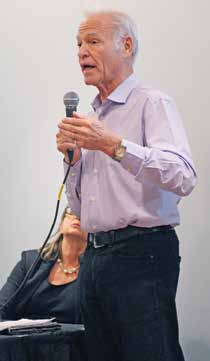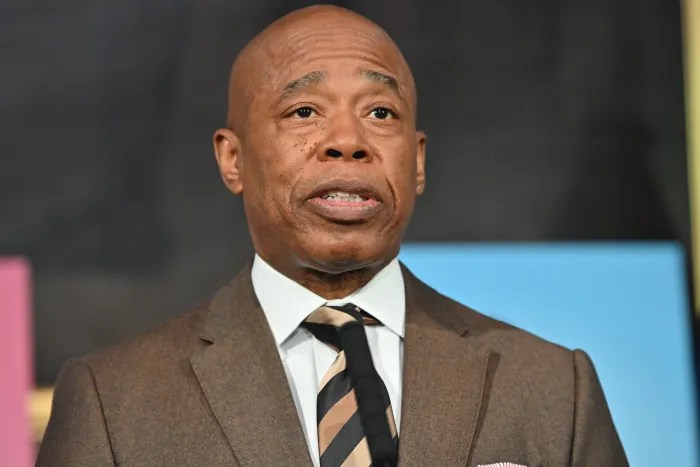
Battery Park City Authority board chairman Dennis Mehiel is under fire from local residents and elected officials after a string a unpopular decisions. Now there’s a push for a state law to require major changes to the governor-appointed board.
BY YANNIC RACK |
Downtown’s representatives in Albany fired another shot this week in the war with Gov. Cuomo over the board that controls Battery Park City. State Sen. Daniel Squadron and Assemblymember Deborah Glick unveiled legislation on Jan. 26 that would require that a majority of the seven-member board of the Battery Park City Authority be local residents.
Currently only one member of the board, which is appointed by the governor, lives in the neighborhood. “Battery Park City has changed,” said Squadron. “The Battery Park City Authority should change with it. It’s a fundamental value that communities should have a say in the decisions affecting them.
Lower Manhattan residents should have that opportunity in Battery Park City.” The announcement came the same day Community Board 1 passed a resolution asking for Cuomo to take advantage of a pair of vacant board seats, as well as two other expired terms, to appoint four Battery Park City residents to the board that controls their neighborhood.
Community board resolutions are purely advisory, but the bill Squadron and Glick propose would give the plea the force of law. Shortly after CB1’s Battery Park City Committee drafted the resolution at its Jan. 5 meeting asking Cuomo to appoint a voting majority to the board — and consult with community leaders when it comes to candidate selection — Squadron and Glick, together with Councilmember Margaret Chin, Borough President Gale Brewer and Congressman Jerrold Nadler, directly wrote to the governor pressing him to appoint a majority slate of Batter Park City residents.
Over the summer, Squadron also renewed his call for the city to exercise it’s long-standing option to wrest the authority away from the governor for the price of a dollar and the assumption of its debts and assets. The city-takeover option has a strong supporter in Tom Goodkind, a community board member and Battery Park City resident — who believes the quest for more representation on the board is a lost cause.
“It’s the same thing again, and again, and again,” he said of the resolution, which includes a deadline for the governor to respond by April 1. “I think it’s a complete waste of time. We’re not really certain, once this ever does get through, that it makes any difference.”
Indeed, even as Squadron announced the new bill at the CB1 meeting on Thursday, he was quick to temper expectations of getting the bill through the Republican-controlled Senate. The calls to oust the leadership of the B.P.C.A. board, or abolish it altogether, have gathered momentum over the past year in the wake of a series of unpopular decisions and tin-eared public-relations missteps durning the tenure of chairman Dennis Mehiel, whose term expired at the end of last year.
(Members of the board continue to serve until a replacement is appointed by the governor.) Residents resented the summary ouster by the board of Tessa Huxley, who helmed the Battery Park City Parks Conservancy for almost three decades, and protested the replacement of the North Cove Marina’s beloved Commodore Michael Fortenbaugh as operator, in favor of a partnership led by a local developer and tenant of the B.P.C.A.
But the common thread among locals’ complaints, large and small, is a lack of communication with residents, or any sense that local opinions or concerns are of any interest to members of a board that seems beholden only to Albany.
A rare public forum held last month, in which select board members took questions from residents, did little to dispel the B.P.C.A.’s reputation for disconnected aloofness. At one point, when asked why the authority didn’t inform residents about its now-controversial plan to hire a private security company, Mehiel said when the board quietly posed a request for proposals on the authority’s website, he considered that ample notice for residents.
Likewise, when residents asked for more details on a host of other aspects of the authority’s workings and decision-making process, rather than answer the questions, board members simply invited residents to file a formal request under the Freedom of Information Law — state legislation that was specifically created to force uncooperative government agencies to divulge public information.
At the authority’s monthly board meeting on Wed., Jan. 27, the legislation announced by Squadron and Glick did not come up. But Mehiel reportedly told the board at the start of the meeting that he had received a call from Bill Mulrow, the governor’s top aide, the day before. According to the Broadsheet, Mulrow, whose title is Secretary to the Governor, asked Mehiel how many seats are supposed to be filled on the board and who appoints them — a strange question given that the answer is his boss.
The apparent oversight raises serious questions about the governor’s disengagement on this issue, but his office did not immediately respond to a request for comment on Thursday.
Martha Gallo, the one board member who lives in the neighborhood, did however cautiously bring up the discontent in the community later on.
“I think the current environment around the dialogue with electeds and the community at large is in need of some remediation,” she said to chairman Mehiel during a discussion of the authority’s financial report. “And I would just ask the board, and Dennis, to consider the broad community engagement model going forward.”
She added that she felt “very enthusiastic” about the way the board runs the neighborhood. “I think we do follow the letter of the law,” Gallo said, “I just think we have some work to do on the spirit around which we engage the community.
We have a little cloud hanging over us in terms of some of the constituents.” Mehiel said he agreed — and claimed the board was already working on being more mindful of residents’ concerns. “My answer to you is ‘yes, we hear you.’ We accept the fact that we haven’t been as effective as we maybe should have been,” he told Gallo.
“We have to do a better job at communicating, and we will do a better job,” he said, later adding that the board carried away “a few scars” from the town hall in December.
Mehiel was not available to answer reporters’ questions after the meeting, and a spokeswoman for the authority would not say whether the governor had been in touch with the B.P.C.A. to discuss the future of the board.




































